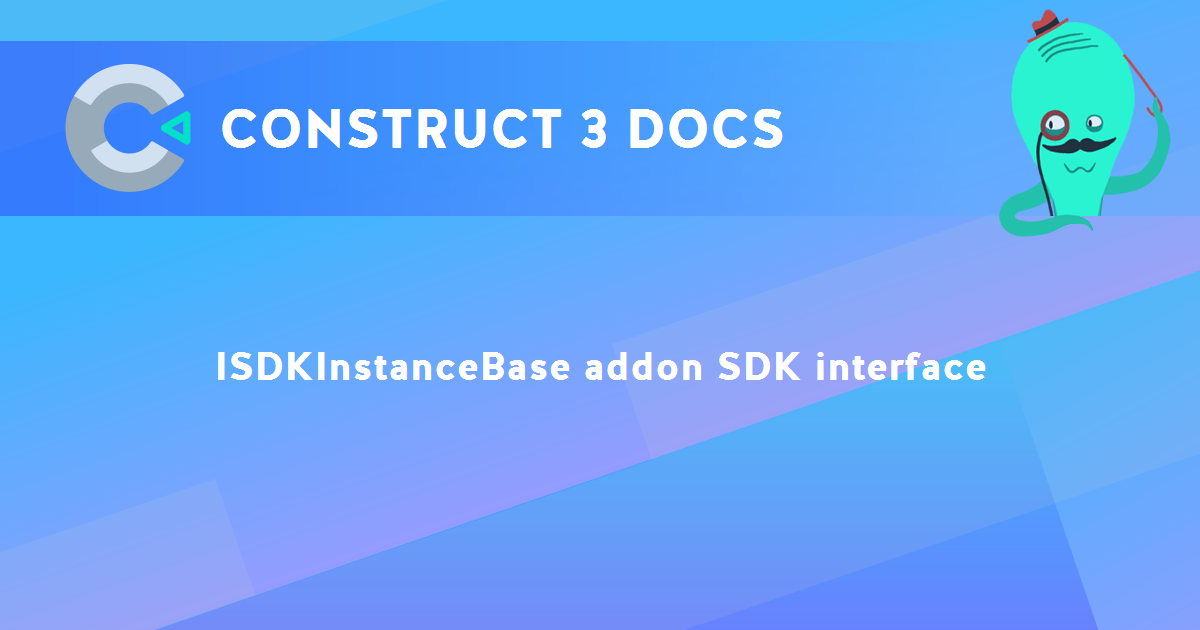ISDKInstanceBase addon SDK interface
The ISDKInstanceBase interface is used as a runtime base class for instances in the addon SDK. It derives from IInstance.
ISDKInstanceBase APIs
- _release()
- Optional override for when an instance is released. Clean up any other resources that need releasing in this method. It must also call
super._release() to release all engine resources.
- _getInitProperties()
- Call this in the constructor to get an array of the instance's properties to create the instance with.
- _trigger(method)
- _triggerAsync(method)
- Fire a trigger condition. The condition must be declared as a trigger in aces.json. Pass a full reference to the condition method, e.g.
this._trigger(C3.Plugins.MyPlugin.Cnds.MyTrigger). The async variant returns a Promise that resolves when the trigger has finished executing, which can be used to support Construct's debugger, as it may wait if it hits a breakpoint inside the trigger.
- _addDOMMessageHandler(handler, callback)
- _addDOMMessageHandlers(arr)
- Add a callback to be run to handle a message posted from a DOM-side script. The handler is a string identifier. The callback receives the posted data as an argument. Note that if the caller in the DOM-side script originally used the
PostToRuntimeAsync method, the callback may be an async function, and the return value is posted back to the DOM-side script. The _addDOMMessageHandlers variant accepts an array of [handler, callback] which is convenient when adding multiple handlers.
- _postToDOM(handler, data)
- _postToDOMAsync(handler, data)
- Post a message to a DOM-side script. The handler is a string identifier. The
data must be structurally clonable (since it is posted down a MessageChannel).
The async method returns a promise that resolves with the DOM-side callback's return value. The non-async method does not return a value and the DOM-side callback's return value is discarded (i.e. a "fire and forget" message).
- _postToDOMMaybeSync(handler, data)
- As with
_postToDOM(), but when the runtime is in DOM mode, calls the DOM handler synchronously inside the call. When the runtime is in worker mode, this still posts a message which is handled later. Usually this method is not necessary, but it can be used to work around some user input restrictions in some browsers in DOM mode only.
- _setTicking(isTicking)
- _setTicking2(isTicking)
- _isTicking()
- _isTicking2()
- Utility methods to start or stop the runtime calling the
_tick() or _tick2() methods of your instance every tick, and also to check whether ticking is active. It is recommended to stop ticking whenever the tick method is no longer needed to reduce the performance overhead of ticking. Redundant calls to start or stop ticking are ignored. The first call always takes effect (i.e. calls do not stack - if you make 3 calls to start ticking then 1 call to stop ticking, ticking is stopped).
- _tick()
- Optional override that is called every tick just before events are run after
_setTicking(true) has been called.
- _tick2()
- Optional override that is called every tick just after events are run after
_setTicking2(true) has been called.
- _getDebuggerProperties()
- Override to return properties to display in the debugger. For more information see runtime scripts.
- _saveToJson()
- Optional override to return a JSON object that represents the state of the instance for savegames.
- _loadFromJson(o)
- Optional override accepting a JSON object returned by a prior call to
_saveToJson() that represents the state of an instance to load, for savegames.
Wrapper extension methods
These methods relate to the use of wrapper extensions. Refer to that manual section for more details; for completeness the relevant methods are also included here.
- _isWrapperExtensionAvailable()
- Returns a boolean indicating whether the corresponding wrapper extension was successfully loaded. If this returns false then no messages sent to the wrapper extension will be received, and async messages will return a promise that never resolves.
- _addWrapperExtensionMessageHandler(messageId, callback)
- _addWrapperMessageHandlers(list)
- Add a callback to be run to handle a message posted from the corresponding wrapper extension. The callback receives the JSON data sent from the wrapper extension as an argument. The
_addWrapperMessageHandlers variant accepts an array of [messageId, callback] which is convenient when adding multiple handlers.
- _sendWrapperExtensionMessage(messageId, params)
- _sendWrapperExtensionMessageAsync(messageId, params)
- Send a message to the wrapper extension. The message ID is used to identify the kind of message.
params is an optional array of parameters to provide. These may only be boolean, number or string type values. The async variant returns a Promise that resolves when the wrapper extension responds to the message. The promise resolves with the JSON data sent from the wrapper extension.
Construct Animate Manual
Construct.net
2024-05-15
2024-09-17

You are here:
Search this manual:
This manual entry was last updated on 17 Sep, 2024 at 17:23